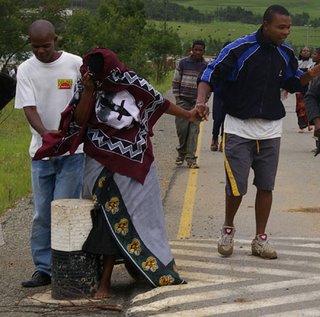
The heart is naked
This week I got angry, which is rather rare for me. My anger was a response to photographs, a news report, and a comment which appeared in the daily Times under the headline, ‘Wife-to-be bolts naked’. The photograph of men holding the woman’s arms was enough to anger me, but the captions underneath the photos irritated me even more: ‘married woman refuses to be tekaed’, ‘a woman they wanted to teka took them for a ride’, ‘caught’, ‘the runaway woman’, and ‘the family members… had to run after her’ (italics mine). The implication is that the woman had no right to say ‘no’, and by running away the woman put everyone to a whole heap of trouble forcing them to go out and catch her and force her back to the homestead.
I don’t know about you, but I see no difference between this and a basic denial of human rights.
The comment, though brave and essentially correct, didn’t help because it didn’t go far enough. Yes, the woman might have been in the wrong; but being in the wrong does not disguise the fact that ‘teka’ as practiced in this way is a sick custom that displays all the hallmarks of slavery—force, the denial of an individual’s rights and wishes, and often (though not in this particular case) abduction. Teka has become a localised version of human trafficking.
Being angry, I aired my views with a whole bunch of people and that initiated some involved and heated discussions. The most interesting comment I received was from a very traditional Dlamini gentleman, who insisted that there is nothing wrong with the teka custom. ‘Teka is for lovers,’ he said. ‘Those people who don’t respect a woman’s wishes and force her are not real Swazis. Those people are ruining our beautiful traditions just because of their own greed. Those aren’t Swazis.’
Perhaps Dlamini is right; I’m willing to reconsider my views after what he said. Maybe the people in the pictures aren’t ‘real Swazis’.
But I have to admit I’m on the side of the woman, however wrong she might be. She reminds me of the story of the pastor who was walking through the village one afternoon. A villager noticed him, and remarked, ‘Hey, pastor, where’s your bike today? I don’t normally see you walking around.’
‘Somebody stole it,’ the priest replied. ‘I suspect one of my parishioners.’
‘Well, tell you what,’ the villager said. ‘When you preach on Sunday, give them the Ten Commandments. They’ll feel guilty, and you’ll get your bike back.’ The following week the pastor was riding around the village again when he met the villager. ‘Hey Preach,’ said the man, ‘I see you got your bike back. Did you give them the Ten Commandments?’
‘I sure did,’ said the priest.
‘And when you got to “Thou shall not steal” you really laid into them?’
‘No,’ said the priest. ‘I only got as far as “Thou shall not commit adultery” and then I remembered where I had left the bicycle.’
When it comes to love, everybody’s heart is naked. The underlying tragedy here—the backstory—appears to be that a woman needed to seek passion in the arms of another man because her husband was not enough. That’s a human story. Everybody needs love, love and romance: we were designed for it, and we can’t ever be complete without it. I’ve said it before, and I’ll say it again: no-one can own another person—that’s slavery. Love is never forced. The woman was at the man’s kraal because she needed love, not because she wanted marriage. If a woman says no, for whatever reason, then no real man needs to chase her down the road and try to force her to marry him. There’s a difference; don’t force it.
